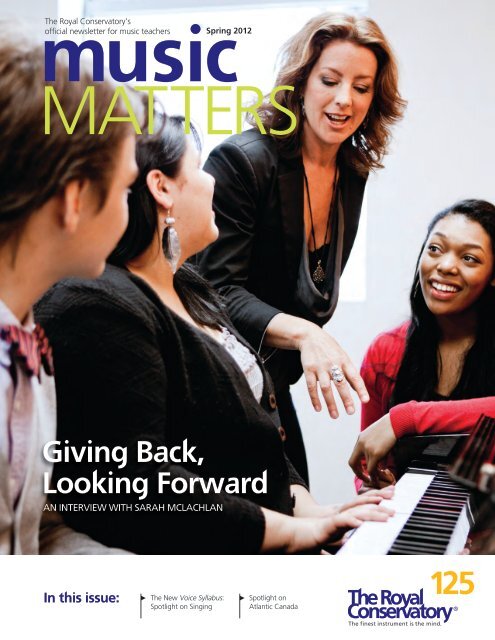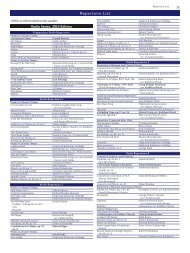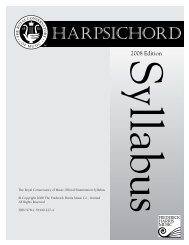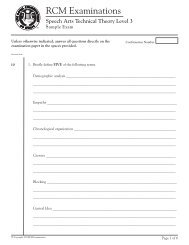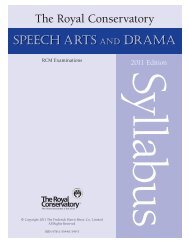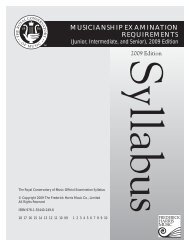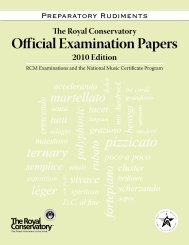Spring 2012 - RCM Examinations
Spring 2012 - RCM Examinations
Spring 2012 - RCM Examinations
You also want an ePaper? Increase the reach of your titles
YUMPU automatically turns print PDFs into web optimized ePapers that Google loves.
music<br />
The Royal Conservatory’s<br />
official newsletter for music teachers<br />
MATTERS<br />
Giving Back,<br />
Looking Forward<br />
AN INTERVIEW WITH SARAH MCLACHLAN<br />
In this issue:<br />
<strong>Spring</strong> <strong>2012</strong><br />
a The New Voice Syllabus:<br />
Spotlight on Singing<br />
a<br />
Spotlight on<br />
Atlantic Canada
Teacher<br />
Professional<br />
Development<br />
Seminars<br />
Achieving Success<br />
BriTiSH CoLuMBiA | ALBerTA | SASKATCHeWAn | MAniToBA | onTArio | QueBeC | ATLAnTiC CAnADA | YuKon<br />
Scheduled for the 2011 – <strong>2012</strong> academic year in locations<br />
across Canada, The royal Conservatory Teacher Professional<br />
Development Seminars will focus on the integral and<br />
creative aspects of music teaching in the 21st century.<br />
These accredited seminars will include master classes,<br />
teaching demonstrations, interactive sessions, online<br />
learning activities, roundtable discussions, and a range<br />
of specific pedagogical and professional topics.<br />
Coming soon: Theory Teacher Professional Development<br />
Seminars in Vancouver, Calgary, and Toronto.<br />
Visit rcmusic.ca/tpd for details.<br />
I enjoyed the chance to observe excellent teaching,<br />
and to have open dialogue about how to teach better.<br />
– Teacher<br />
I enjoyed meeting other teachers, making connections<br />
and new friends. I also learned a great deal from the<br />
master class.<br />
– Student<br />
For more information, contact<br />
teachereducation@rcmusic.ca<br />
or visit rcmusic.ca/tpd<br />
Presenters<br />
Marc Durand<br />
Dianne Werner<br />
James Anagnoson<br />
Jennifer Snow<br />
Thomas Green<br />
Janet Lopinski<br />
Andrew Hisey<br />
Linda Kundert-Stoll<br />
Kent McWilliams<br />
Christine Vanderkooy<br />
Christopher Hahn<br />
Dale Wheeler<br />
and more…<br />
Registration:<br />
regular $99 | Student $50<br />
includes lunch and light<br />
refreshments.
Sarah McLachlan photos, cover and this page: Kharen Hill<br />
The Royal Conservatory’s<br />
official newsletter for music teachers<br />
Dr. Jennifer Snow, Chief Academic Officer<br />
Dr. Thomas Green, Chief Examiner, Practical Subjects<br />
Maria Case, Chief Examiner, Theoretical Subjects<br />
Dr. Anita Hardeman, Manager, Teacher Relations<br />
4<br />
2 9<br />
Music Matters aims to provide pedagogical support and<br />
relevant information from The Royal Conservatory in its<br />
mandate to develop human potential through music and the arts.<br />
Members of the academic community offer fresh perspectives<br />
and useful information on teaching and managing a successful<br />
music studio, while celebrating excellence in music. Current<br />
and previous issues of Music Matters may be downloaded free<br />
of charge from our website: examinations.rcmusic.ca<br />
music<br />
The Royal Conservatory’s<br />
official newsletter for music teachers<br />
<strong>Spring</strong> <strong>2012</strong><br />
MATTERS<br />
2 a The New Voice Syllabus:<br />
Spotlight on Singing<br />
4 a Mentor Memories with singersongwriter<br />
Sarah McLachlan<br />
8 a Syllabus updates<br />
Grade 10 Piano Repertoire Supplemental<br />
iSCORE<br />
The Music Matters Blog<br />
a<br />
Q&A with an Examiner<br />
9 a The Royal Conservatory Across<br />
Canada: Spotlight on Atlantic Canada<br />
BACK a Candidate Services Corner:<br />
Recognition of Accomplishment –<br />
Certificates<br />
Replacement Certificates<br />
Duplicate Certificates<br />
Theory Co-requisites<br />
a Important Dates:<br />
<strong>2012</strong> Session Dates Announced!<br />
Click.<br />
Tweet.<br />
Connect!<br />
Staying in touch with<br />
The Royal Conservatory<br />
has never been easier.<br />
CONTACT US<br />
Article requests or questions about this publication?<br />
Please email us at: musicmatters@rcmusic.ca<br />
examinations.rcmusic.ca<br />
music MATTERS | <strong>Spring</strong> <strong>2012</strong> 1
The Voice Syllabus,<br />
<strong>2012</strong> edition and Resonance :<br />
A Comprehensive Voice Series<br />
By BARBARA DUNN PROSSER<br />
Today’s performing world resonates<br />
with aspiring vocalists, nurtured by a<br />
multitude of talent shows and driven<br />
by the hope of being discovered as the<br />
next singing superstar. While these<br />
competitions may create a rollercoaster<br />
of expectation and disappointment, the<br />
current tide of enthusiasm for singing<br />
benefits the voice teacher by encouraging<br />
those who might otherwise not have<br />
thought of using their voices in this way.<br />
Technology and the Internet make it<br />
easy for us to access repertoire, transpose<br />
keys of songs, or discover the works of<br />
new composers, thereby offering our<br />
students more diversity than ever before.<br />
With such resources, it need no longer<br />
be just a few exceptionally talented<br />
individuals, or those with connections to<br />
the industry, who can find their place in<br />
the spotlight.<br />
In light of these developments,<br />
the task of revising the 2005 Voice<br />
Syllabus was both an exciting adventure<br />
and at times a daunting challenge. It<br />
was essential to maintain The Royal<br />
Conservatory’s heritage of teaching<br />
classical repertoire and healthy vocal<br />
2 examinations.rcmusic.ca<br />
production and musicianship. In order<br />
to keep up with the times, it was also<br />
necessary to include Popular Music lists<br />
for all levels, carefully chosen to be ageappropriate<br />
and lyrical, with musical<br />
and dramatic challenges for each level.<br />
Specific arrangements were selected and<br />
cited to ensure quality and consistency.<br />
While these lists are optional for all<br />
exams except the Teacher’s ARCT, it<br />
is hoped that singers and teachers will<br />
appreciate their relevance and value.<br />
The previous syllabus contained<br />
many wonderful songs for young voices,<br />
but it was clear that their vocabulary,<br />
imagery, and subject matter would no<br />
longer interest young people today.<br />
Some advanced repertoire that might be<br />
an exciting complement to a university<br />
graduate recital was found to be less<br />
useful or relevant to our students and<br />
ineffective as examination material.<br />
Repertoire is now limited to songs<br />
in English, French, German, Italian,<br />
Spanish, and Latin, to ensure that exam<br />
candidates will be equitably assessed on<br />
pronunciation and presentation of the<br />
text. Finally, at the ARCT level, some<br />
operatic arias too challenging for even<br />
this level of examination were deleted.<br />
Approximately 350 songs have been<br />
added to the syllabus lists. Standard<br />
repertoire from the various historical<br />
periods is joined by compositions by<br />
hitherto unpublished composers or<br />
composers whose works may be new to<br />
North Americans. The works of Betty<br />
Roe, Lin Marsh, and Donna Rhodenizer<br />
are featured in junior levels. There are<br />
new arrangements of songs in the public<br />
domain by Christine Donkin, Forrest<br />
and Akiko Kinney, Stephen Chatman,<br />
Mark Mrozinski, Kathleen Wood, and<br />
Nancy Telfer. In the more advanced<br />
levels, songs by Jeff Smallman, Berthold<br />
Carrière, Richard Hundley, Ben Moore,<br />
Martha Hill Duncan, Jack Heggie, John<br />
Greer, Maria Case, and Alice Ho provide<br />
beautiful original melodies and settings<br />
of familiar texts.<br />
Changes were made to increase the<br />
efficiency of the examination procedure,<br />
and some requirements were adjusted<br />
to improve accessibility and uniformity.<br />
The repertoire portion of the exam is to<br />
be sung first, with suggested time limits
a The Voice Syllabus, <strong>2012</strong> edition<br />
and Resonance: A Comprehensive Voice Series (continued from page 2)<br />
from Level 6 upwards. Levels 6 and 7<br />
now require only one vocalise using the<br />
five Italian vowels [i], [e], [a], [o], [u]<br />
and [y] (German [ü]). Sight-singing tests<br />
are divided into two parts: clapping the<br />
rhythm of a passage, then a combined<br />
rhythm and melody singing of the same<br />
test. Melody singbacks begin at Level<br />
5, and a mezza di voce exercise has been<br />
introduced at Level 8. Some descending<br />
intervals have been deleted from the<br />
tests for the junior levels. New sight<br />
and ear test examples in the syllabus<br />
more accurately reflect what will be<br />
asked on the examination. Finally, the<br />
Preparatory Level will be given a graded<br />
assessment based on intonation, note<br />
and rhythmic accuracy, diction, posture,<br />
facial expression, breathing, phrasing,<br />
and memory.<br />
Changes were made to the<br />
requirements of the Teacher’s ARCT<br />
exam to ensure prospective teachers’<br />
familiarity with the curriculum and<br />
popular music. Candidates must<br />
demonstrate technical exercises from<br />
any of the lower levels, and musical<br />
theatre repertoire is compulsory for<br />
the performance part of this exam. In<br />
the Viva Voce section, knowledge of<br />
current vocal production terminology is<br />
expected, as is the ability to demonstrate<br />
all genres from the lists in Resonance TM : A<br />
Comprehensive Voice Series.<br />
In assembling the repertoire for<br />
Resonance TM it was necessary to meet the<br />
diverse needs and interests of different<br />
genders, ages, and voice types, and<br />
ensure various languages and genres<br />
were represented. Songs progress in<br />
difficulty from Preparatory to Level<br />
8. There are also four progressively<br />
graded Vocalise/Recitative volumes.<br />
Overall, forty percent of the content has<br />
changed from the previous series.<br />
The Preparatory to Level 3 volumes<br />
feature such composers as Betty Roe<br />
(Ten Ponder and William Songs),<br />
Donna Rhodenizer (Computer Cat and<br />
Dinosaurs, Dragons and Me) and Lin<br />
Marsh (Serendipity Solos). Several folk<br />
songs have new arrangements and some<br />
foreign language songs have new English<br />
lyrics. For example, Ma Bella Bimba in<br />
Level 1 has been arranged by Christine<br />
Donkin; Forrest and Akiko Kinney<br />
have arranged Auprès de ma blonde in<br />
Level 3; and Nancy Telfer has created<br />
an arrangement of the French Canadian<br />
classic Un Canadien Errant. Popular<br />
music selections range from Dites Moi<br />
(Rodgers), to Happiness (Schmitt), to<br />
Swinging on a Star (Van Heusen)<br />
New songs in Levels 4 to 6 include<br />
Gloria in Excelsis by Robert B. Anderson,<br />
Già la notte s’avvicina by Isabelle<br />
Colbran, Moon, sing by Jon Washburn,<br />
and Singin’ the Blues by Donna<br />
Rhodenizer. There are new settings<br />
of traditional texts and tunes, such as<br />
Linda Fletcher’s Olde Irish Blessing and<br />
Forrest and Akiko Kinney’s Morning Has<br />
Broken. Many will be pleased to see the<br />
return of Patsy Ford Simms’s favourite<br />
spiritual Climbin’ up the Mountain in<br />
Level 6. The popular music selections<br />
include My House (Bernstein), Oh! What<br />
a Beautiful Morning (Rodgers), and Little<br />
Maid of Arcadee (Sullivan).<br />
Levels 7 and 8 contain arrangements<br />
of Purcell’s Fairest Isle, Boyce’s Tell Me<br />
Lovely Shepherd, and Lully’s Bois Epais<br />
by Kathleen Wood; such standards as<br />
Handel’s Bel Piacere and Schubert’s<br />
Lachen und Weinen; and Roger<br />
Quilter’s Music When Soft Voices Die<br />
and Richard Hundley’s Come Ready and<br />
See Me. Contemporary musical theatre<br />
selections include Starlight by Jim Betts<br />
and Only Love by Frank Wildhorn.<br />
Two exciting additions have been<br />
made to each repertoire book: an<br />
accompaniment CD and a basic guide<br />
to the International Phonetic Alphabet.<br />
The latter is a fundamental teaching<br />
tool that is essential to the development<br />
of accurate pronunciation; it offers a<br />
quick resource for both the teacher<br />
and the student when approaching an<br />
unfamiliar language.<br />
The CD will help familiarize students<br />
with accompaniments and allow teachers<br />
to take time out from accompanying<br />
to observe their students. There is no<br />
substitute for a live accompanist, of<br />
course, but the CDs assist the learning<br />
process by providing a guide to<br />
performance and the chance to practise<br />
with accompaniments at home.<br />
As is often said, singing is what<br />
happens in operas or musicals when<br />
words are no longer enough to convey<br />
the depth of emotion felt by the<br />
character. The setting of words to music<br />
intensifies their meaning, not just in the<br />
mind but in the hearts of both singer<br />
and audience. This syllabus reflects<br />
our belief that there truly is a song for<br />
every person. We are grateful to all the<br />
composers, arrangers, and poets who<br />
offer us the chance to lift our voices out<br />
of the everyday darkness and into that<br />
shining spotlight where we all can have<br />
music in our lives.<br />
BARBARA<br />
DUNN PROSSER<br />
Barbara holds a Master<br />
of Arts in English<br />
Literature, an Honours<br />
Bachelor of Arts in<br />
Music and English, and a Bachelor of<br />
Education in Music, English, and Drama<br />
from Queen’s University as well as ARCT<br />
Diplomas in Voice Performance and<br />
Piano Performance. She is a member<br />
of the National Association of Teachers<br />
of Singing and The Royal Conservatory<br />
College of Examiners, where she serves<br />
on the Council of Examiners. Barbara<br />
teaches voice in Stratford, Ontario and at<br />
The University of Western Ontario.<br />
In her performing career, Barbara has<br />
appeared in Rhombus Media’s film of<br />
Mozart’s Don Giovanni, toured southern<br />
Ontario with her one-woman show, and<br />
been a featured soloist with symphony<br />
orchestras across North America.<br />
Barbara spent several seasons with the<br />
Canadian Opera Company, the Stratford<br />
Shakespeare Festival and in both the<br />
touring and Toronto companies of The<br />
Phantom of the Opera.<br />
Barbara, with her colleague Susan<br />
Ambrose, was a co-compiler of the<br />
Frederick Harris Music Co., Limited’s<br />
<strong>2012</strong> publication Resonance TM : A<br />
Comprehensive Voice Series, and the<br />
<strong>2012</strong> edition of The Royal Conservatory’s<br />
Voice Syllabus, <strong>2012</strong> edition.<br />
music MATTERS | <strong>Spring</strong> <strong>2012</strong> 3
Mentor Memories<br />
with singer-songwriter Sarah McLachlan<br />
Mentor Memories invites leading arts professionals to share memorable moments of inspiration<br />
and motivation. In this issue, we are delighted to present an interview with celebrated<br />
singer-songwriter Sarah McLachlan, an alumna of The Royal Conservatory.<br />
While Sarah McLachlan is beloved by<br />
millions for her warm and evocative<br />
music, she continues to make an<br />
important contribution to arts education.<br />
Inspired by the influence of music<br />
in her life, she long dreamed of opening<br />
a music school for inner-city youth.<br />
Music had a profound impact on her,<br />
and Sarah decided she could make a<br />
difference by bringing music education<br />
into the lives of young people who<br />
otherwise would not have access to it.<br />
Her dream was first realized through<br />
the creation of The Sarah McLachlan<br />
Foundation in 1999, and was expanded<br />
in 2002 with the launch of a free afterschool<br />
program: The Sarah McLachlan<br />
Music Outreach – An Arts Umbrella<br />
Project (SMMO).<br />
Founded on a belief in the enriching<br />
power of music and the importance<br />
of building creative communities, the<br />
program, now known as the Sarah<br />
McLachlan School of Music, provides<br />
4 examinations.rcmusic.ca<br />
an inspirational learning environment<br />
fostering the confidence and success of<br />
its students. The school offers them a<br />
secure, inspiring place to learn, practice,<br />
and connect with other like-minded<br />
youth. Students acquire a lifelong<br />
appreciation of music, an enthusiasm<br />
for learning, and the skills necessary<br />
to unleash their creative potential<br />
and to develop friendships that will<br />
last a lifetime. Over the last ten years,<br />
hundreds of students have learned<br />
piano, guitar, percussion, voice, and<br />
songwriting. They have enjoyed the<br />
music lab and participated in children’s<br />
and youth choir and ensembles,<br />
mentored by professional musicianeducators.<br />
As McLachlan reflected on the<br />
impact of music on her life, she realized<br />
that music enabled her to develop a<br />
sense of pride and self-worth. It also<br />
gave her the tools she needed to tackle<br />
the many challenges she would face<br />
both personally and professionally.<br />
In this inspiring interview, McLachlan<br />
shares her insights and experiences as a<br />
student, a teacher, and an internationally<br />
successful performer.<br />
What do you recall about your first<br />
experience with music?<br />
I remember being four years old and<br />
devouring my mother’s recordings by<br />
artists of the time—Joan Baez, Simon<br />
and Garfunkel, and Cat Stevens. I<br />
begged her for a guitar so I could play<br />
and sing just like them. I was so excited<br />
when I was given a ukulele (as I was too<br />
small for a guitar) and I took lessons just<br />
up the street from my house. Because I<br />
loved to perform, my mother would have<br />
me sing for her friends when they visited.<br />
Who was your most important<br />
teacher and how did he or she<br />
influence you?<br />
My high school art teacher, because he<br />
Photo: Kharen Hill
a Mentor Memories<br />
with singer-songwriter Sarah McLachlan (continued from page 4)<br />
let me be myself and always encouraged<br />
me to do my very best. This really<br />
affected me because I liked and respected<br />
him, and wanted to please him.<br />
What impact has The Royal<br />
Conservatory had on you?<br />
The Royal Conservatory provided me<br />
with an excellent basic understanding<br />
of theory and musical structure, which I<br />
have carried with me throughout my life<br />
and career in music.<br />
At what point did you decide to<br />
become a professional musician?<br />
I was offered a recording contract at<br />
nineteen years old . . . how does one say<br />
“no” to that?<br />
What first inspired you to write<br />
songs?<br />
I’d been working with another band and<br />
helping to write melodies. I’d never sat<br />
down to write pieces all by myself, until<br />
I received the recording contract. So<br />
really, getting a record deal was hugely<br />
influential in pushing me to get going.<br />
When writing lyrics, I focused mostly<br />
on imagery, as until that time, I had<br />
been a visual artist.<br />
Where do you presently find<br />
inspiration?<br />
I find constant inspiration in the<br />
emotional struggles we all face as<br />
humans as we try to relate to each<br />
other and get along with our incredibly<br />
limited understanding of ourselves and<br />
the world around us.<br />
Was there a low point in your<br />
growth as a musician and how did<br />
this influence you?<br />
Early in my career I was signed to a<br />
major US label and was being “A and<br />
R’ed” (groomed for release by the<br />
Artist and Representation department)<br />
for the first time in my life. During<br />
the recording of my second album, I<br />
thought we were doing great, emotional<br />
work, but when the label’s representative<br />
listened to what we’d done, he was<br />
very dismissive. He complained that he<br />
“didn’t hear a single” and said, “you can<br />
yodel on the rest of the record for all I<br />
care, as long as I get three strong singles<br />
to work with.” I asked him if the music<br />
made him feel anything and he told me<br />
that was not the point.<br />
I was very disheartened, but my<br />
producer told me that my music was<br />
good. He reminded me that if you<br />
follow your gut and are true to yourself<br />
then you are already successful.<br />
My manager at the time convinced<br />
the people at the record label to leave<br />
me alone to “make it or break it” on my<br />
own. They did, and luckily, it worked!<br />
They liked the finished record and it did<br />
well. I continue to follow my instincts<br />
and it has served me very well.<br />
In your opinion, what is the value<br />
of music education?<br />
It is incredibly important for children<br />
to have music in their lives. Music helps<br />
us connect to ourselves and with each<br />
other. There are many studies proving<br />
that the study of music gives children<br />
a step up in other academic areas. It<br />
contributes to the development of wellrounded,<br />
emotionally connected human<br />
beings and helps set them up for success.<br />
I typically do not teach, although I<br />
have on occasion been in the position to<br />
work with a group of kids to inspire and<br />
guide them and I have loved it! They are<br />
engaged and tuned in, and so open to<br />
learning.<br />
Do you have any tips on how to<br />
engage students with music?<br />
It’s important for students to like<br />
what they’re playing and feel some<br />
connection with the music.<br />
Your music school gives back to<br />
your community in a powerful<br />
way. How can our readers become<br />
involved in similar/different ways<br />
to impact their own communities?<br />
I encourage organizations that offer<br />
music lessons to add some kind of<br />
bursary or free outreach element to their<br />
programs or solicit others to financially<br />
sponsor a child’s lessons. Teachers<br />
could also volunteer their time and get<br />
involved with music education in their<br />
community.<br />
What advice do you give the<br />
students at your school?<br />
I rarely offer advice unless it’s asked<br />
for, but one thing I do stress is the<br />
importance of trying to figure out what<br />
brings you joy and do it as often as<br />
possible. If it is music that brings joy,<br />
then “hooray!”<br />
How do you encourage the<br />
musicians at your school to<br />
collaborate? Is there one<br />
collaborative experience that<br />
stands out?<br />
We have no shortage of collaborations<br />
at our school, as it’s a big part of our<br />
curriculum. The students are nurtured<br />
to be free and open as they explore<br />
different ways of making music like<br />
singing together, and playing in<br />
ensembles. Music should be shared, so<br />
performance is encouraged.<br />
The children also write songs. The<br />
best experience thus far happened in<br />
December as I guided the students in<br />
writing a Christmas song. It happened<br />
spontaneously during a photo shoot. I<br />
spent the day at the school with various<br />
students. We all had instruments, so<br />
it was easy and natural for us to start<br />
playing together. A song began to evolve<br />
so I encouraged the students to explore<br />
different possibilities with lyrics and<br />
melody. We had the better part of a<br />
song by the end of the day. A senior<br />
student finished the lyrics at home. We<br />
recorded it, filmed it, and posted it for<br />
free on the Internet the next week.<br />
In your opinion, what is the place<br />
of popular music in a traditional<br />
music lesson?<br />
I think if you want to keep children<br />
engaged in their studies, then you<br />
need to provide a wide range of music.<br />
Classical music provides a good basis<br />
of understanding that can provide a<br />
jumping-off point into many other<br />
kinds of music.<br />
What is next for you as an artist,<br />
and as an educator?<br />
I’m writing songs for my next record<br />
and working hard on fund-raising plans<br />
for the school. I see the impact that<br />
music education has on young people.<br />
I would like to be able to expand our<br />
programming in the years to come.<br />
Giving more students access to music<br />
would be very meaningful to me.<br />
music MATTERS | <strong>Spring</strong> <strong>2012</strong> 5
Summer Summits<br />
Inspiring the Whole Musician<br />
July 7 & 8, <strong>2012</strong><br />
Toronto, ON<br />
July 28 & 29, <strong>2012</strong><br />
Vancouver, BC<br />
• Join creative leaders from across North America as<br />
they lead practical, interactive, and insightful sessions.<br />
• Engage in valuable seminars and discovery<br />
learning activities that inspire discussion and<br />
creative experience.<br />
• Learn creative strategies to motivate and inspire<br />
your students.<br />
• Explore resources, ideas, and a range of<br />
teaching and professional strategies.<br />
• Connect and network with colleagues from<br />
across the continent.<br />
TORONTO, ON | JULY 7 & 8, <strong>2012</strong><br />
8:45am to 6:00pm (check-in starts at 8:15am)<br />
The Royal Conservatory<br />
TELUS Centre for Performance and Learning<br />
273 Bloor Street West, Toronto, ON, M5S 1W2<br />
VANCOUVER, BC | JULY 28 & 29, <strong>2012</strong><br />
8:45am to 6:00pm (check-in starts at 8:15am)<br />
Vancouver Academy of Music<br />
1270 Chestnut Street, Vancouver, BC, V6J 4R9<br />
FEES AND REGISTRATION<br />
Early rate: Teachers: $275 | Students: $150<br />
Regular rate (after April 30, <strong>2012</strong>):<br />
Teachers $325 | Students $195<br />
Fee includes lunch, refreshments, a seminar package,<br />
and a Professional Development Certificate. Breakfast is not<br />
available. Seminar presenters and topics are subject to change.<br />
For more information,<br />
contact teachereducation@rcmusic.ca or visit rcmusic.ca/tpd.
JULY 7 & 8, <strong>2012</strong><br />
Toronto, ON<br />
Keyboard<br />
FEATURING<br />
PRESENTERS:<br />
Randy Faber<br />
• ABC’s of Artistry<br />
• Stages of Talent Development<br />
Peter Jutras<br />
• The Future of Pedagogy:<br />
Teaching the Next Generation<br />
• It’s Never Too Late:<br />
Teaching Adult Music Students<br />
Scott Price<br />
• Including Students with Special<br />
Needs in the Piano Studio<br />
• Autism and Piano Study:<br />
A Basic Teaching Vocabulary<br />
Laurel Trainor<br />
• Music and the Brain<br />
AND INTERACTIVE<br />
SEMINARS WITH:<br />
Jennifer Snow<br />
Thomas Green<br />
Janet Lopinski<br />
Voice<br />
FEATURING<br />
PRESENTERS:<br />
Mary Lou Fallis<br />
• Back to Basics<br />
• Inspiring the Whole Singer<br />
Scott McCoy<br />
• Using Acoustic Analysis as<br />
Feedback in the Voice Studio<br />
• Understanding the Relationship<br />
Between Vowels and Pitch<br />
Chris Arneson<br />
• Performance Anxiety:<br />
A 21st Century Perspective<br />
Susan Knight<br />
• Choral Pedagogy<br />
Donald Simonson<br />
• Fact Based Voice Teaching:<br />
Removing Myth from the<br />
Studio<br />
AND INTERACTIVE<br />
SEMINARS WITH:<br />
Robert Loewen<br />
Tina Torlone<br />
Featuring an exploration of<br />
Resonance: A Comprehensive Voice<br />
Series and the new Voice Syllabus,<br />
<strong>2012</strong> edition.<br />
JULY 28 & 29, <strong>2012</strong><br />
Vancouver, BC<br />
Keyboard<br />
FEATURING<br />
PRESENTERS:<br />
Marvin Blickenstaff<br />
• Pedagogy 101:<br />
A Review of the Basics<br />
• The End is in the<br />
Beginning: Coaching<br />
a Piece to Performance<br />
Forrest Kinney<br />
• Topic TBA<br />
Jennifer Snow<br />
• Sparking The Musical<br />
Imagination: Inspiring<br />
Personal Expression in<br />
Student Performance<br />
Midori Koga<br />
• Balanced Poise:<br />
Unlocking Sound and<br />
Artistic Potential<br />
AND INTERACTIVE<br />
SEMINARS WITH:<br />
Linda Kundert-Stoll<br />
…and more.<br />
Highlights include master classes,<br />
teaching demonstrations, interactive<br />
seminars, discovery learning activities,<br />
and a range of specific pedagogical<br />
and professional topics.
SYLLABUS UPDATES<br />
The Guitar Syllabus, 2011 Edition, took effect<br />
September 1, 2011. Guitar requirements in the<br />
Guitar Syllabus, 2004 Edition will be accepted<br />
for a one-year crossover period ending August<br />
31, <strong>2012</strong>.<br />
The Speech Arts and Drama Syllabus, 2011<br />
Edition took effect September 1, 2011. The new<br />
Syllabus has replaced the previous edition and<br />
there is no crossover period.<br />
The Voice Syllabus, <strong>2012</strong> Edition, will take<br />
effect September 1, <strong>2012</strong>. Voice requirements<br />
in the Voice Syllabus, 2005 Edition will be<br />
accepted for a one-year crossover period ending<br />
August 31, 2013.<br />
GRADE 10 PIANO REPERTOIRE<br />
SUPPLEMENTAL<br />
Grade 10 Piano candidates are reminded<br />
that they may repeat, as a supplemental<br />
examination, any two sections of their practical<br />
examination, including repertoire. To satisfy<br />
the practical Grade 10 requirements, all<br />
supplemental practical examinations must be<br />
successfully completed within two years of the<br />
original practical examination period.<br />
iSCORE<br />
On January 11, <strong>2012</strong>, The Royal Conservatory,<br />
together with Concordia University and Queen’s<br />
University, launched iSCORE, the first bilingual<br />
online module designed specifically to support<br />
music study and instruction. iSCORE helps<br />
facilitate communications between music<br />
teachers and students, regardless of distance<br />
or time, ensuring a thorough online learning<br />
and evaluation process. For more information,<br />
please visit iscore.rcmusic.ca<br />
THE MUSIC MATTERS BLOG —<br />
A PLACE FOR TEACHERS<br />
TO SHARE IDEAS!<br />
Connect with an international community of<br />
music teachers and join in conversations about<br />
pedagogy on our Music Matters Blog.<br />
This new interactive medium features speciallycommissioned<br />
articles, discussions with our<br />
noted alumni, and other personal interest blog<br />
posts. As well, previous Music Matters articles<br />
will be revisited and opened to discussion.<br />
Visit: rcmusic.ca/musicmattersblog<br />
8 examinations.rcmusic.ca<br />
Q&A<br />
How does the new Preparatory<br />
level differ from the Introductory<br />
level in the previous syllabus?<br />
One difference teachers and candidates<br />
will notice in the <strong>2012</strong> edition of<br />
the syllabus, is that the Preparatory<br />
Examination is graded, whereas<br />
candidates received comments only for<br />
the Introductory examination as listed<br />
in the Voice Syllabus, 2005 edition.<br />
To aid beginning vocalists, marks for<br />
the Preparatory level are broken down<br />
into two equally-weighted categories:<br />
Voice Production and Presentation.<br />
Voice Production includes diction, note<br />
accuracy, rhythmic accuracy, intonation,<br />
and posture. Presentation encompasses<br />
facial expression/stage presence, breathing<br />
and phrasing, and memory. Like the<br />
Introductory Examination, candidates are<br />
required to prepare two pieces by different<br />
composers from the syllabus list, and must<br />
sing from memory.<br />
Is it mandatory that music from<br />
the Popular Music List be included<br />
in the examination repertoire?<br />
The Popular Music List is an exciting<br />
addition to the <strong>2012</strong> Voice Syllabus.<br />
Candidates from Grades 1 through 10<br />
now have the option of preparing a<br />
selection from musical theatre, operetta,<br />
folk rock, jazz standards, and parlour<br />
songs for their examination. Candidates<br />
preparing for the Performer’s ARCT<br />
examination may choose to include<br />
a Popular Music selection. Teacher’s<br />
ARCT candidates must include one<br />
selection from the Popular Music list<br />
for the Performer’s ARCT (List F).<br />
When preparing a Popular Music<br />
selection, the candidate’s music must<br />
ABOUT THE<br />
VOICE SYLLABUS,<br />
<strong>2012</strong> EDITION<br />
match the arrangements in the books<br />
cited in the syllabus. For Grades 1 to<br />
8, the music may be transposed, but<br />
for Grades 9 and 10 and both ARCT<br />
examinations the music must be<br />
performed in the original key.<br />
Will there be a crossover period<br />
for the new syllabus?<br />
Yes, teachers and candidates may<br />
prepare for examinations using either<br />
the Voice Syllabus, 2005 edition or the<br />
Voice Syllabus, <strong>2012</strong> edition for any<br />
examinations taking place between<br />
September 1, <strong>2012</strong> and August 31, 2013.<br />
I see that time limits are now<br />
suggested for repertoire beginning<br />
in Grade 6. Why were time limits<br />
introduced? What happens if my<br />
student exceeds the time limit?<br />
Suggested time limits for repertoire<br />
are provided in the new syllabus<br />
beginning at Grade 6. For example,<br />
Grade 6 candidates are advised that the<br />
repertoire portion of their examination<br />
program should not exceed fourteen<br />
minutes, while thirty minutes is<br />
suggested for Grade 10 candidates. The<br />
time limits were introduced to teach<br />
the necessary skill of appropriately<br />
timing a program, something that is<br />
crucial for auditions, recordings, and<br />
performances. Limits were introduced<br />
at the Grade 6 level in recognition of<br />
the increased level of maturity in the<br />
repertoire, which requires the same<br />
maturity in the candidate. Candidates<br />
who exceed the time limits may be<br />
stopped during their performance by<br />
the examiner.<br />
You Asked<br />
When will I receive my practical examination schedule for April?<br />
Confirmation numbers and schedules will be mailed to all registrants on or<br />
before March 9th, <strong>2012</strong>.
a The Royal Conservatory Across Canada – The latest news about<br />
Royal Conservatory music and arts education in communities across Canada.<br />
THE ROYAL CONSERVATORY ACROSS CANADA<br />
Spotlight on<br />
Atlantic Canada<br />
GOLD MEDAL CEREMONY<br />
IN HALIFAX, NS<br />
An enthusiastic crowd greeted participants<br />
in the first ever Gold Medal Awards<br />
Ceremony, held Saturday, November 26<br />
in the Lilian Peircey Room of the Maritime<br />
Conservatory of Performing Arts in Halifax,<br />
Nova Scotia. Over 50 students and their<br />
teachers, as well as proud families, were<br />
addressed by Chief Examiner of Theoretical<br />
Subjects Maria Case and awarded Royal<br />
Conservatory Gold Medals. Several<br />
recipients were invited to perform in the<br />
Gold Medallists’ recital, which featured<br />
performances from piano, voice, violin, and<br />
speech arts and drama medalists.<br />
As part of The Royal Conservatory’s 125th<br />
anniversary celebrations, Silver Medals<br />
were transformed into Gold Medals. The<br />
recipients of these awards have achieved<br />
the highest mark in their region in their<br />
practical examination and have completed<br />
all theoretical co-requisites. We were thrilled<br />
to celebrate this significant accomplishment<br />
with the medalists, their families, and their<br />
teachers!<br />
We extend our thanks to Frances Royles,<br />
who performed the prelude, processional,<br />
and O Canada. Thank you also to the<br />
Nova Scotia Registered Music Teachers’<br />
Association, particularly Lexie Blackler,<br />
who acted as the Reader for the ceremony,<br />
and The Royal Conservatory’s staff and<br />
volunteers, who planned and executed an<br />
impressive event and set a high standard for<br />
the next set of Gold Medal ceremonies in<br />
Saskatchewan and Manitoba.<br />
TEACHER PROFESSIONAL<br />
DEVELOPMENT COMES<br />
TO THE “ISLANDS”<br />
The Royal Conservatory was pleased to<br />
present Teacher Professional Development<br />
Seminars in two new Atlantic Canada<br />
locations this past fall. We travelled to St.<br />
John’s, NF on October 26 and Charlottetown,<br />
PEI on October 27. Master teacher Dianne<br />
Werner gave two master classes featuring<br />
each island’s best students. The discussion<br />
following the student performances focused<br />
on developing a healthy and effective physical<br />
approach to the practice and performance of<br />
technical skills, and transitioning those skills<br />
into the study of repertoire.<br />
Active conversations about these topics<br />
continued through the lunch hour, and<br />
these ideas were reinforced in the afternoon<br />
session by Dr. Andrew Hisey. Dr. Hisey, a<br />
senior examiner with The Royal Conservatory,<br />
addressed the subject of practical<br />
examinations. While students and teachers<br />
may view examinations with apprehension,<br />
Dr. Hisey reminded the seminar attendees<br />
that examinations should provide a positive<br />
personal experience that motivates students<br />
to continue on their musical journey. His<br />
y<br />
‘insider’ perspective allowed the group to<br />
look at the examination process from the<br />
examiner’s point of view. Helping students to<br />
do the same is one way to effectively prepare<br />
them for examination day.<br />
The closing discussions led by Dr. Hisey in<br />
both St. John’s and Charlottetown brought<br />
the main themes of the day to the forefront:<br />
that the experience of making music should<br />
be positive and affirming for all our students!<br />
Presenting our first Teacher Professional<br />
Development Seminars in Newfoundland<br />
and Prince Edward Island was a wonderful<br />
experience, and The Royal Conservatory looks<br />
forward to returning to Atlantic Canada with<br />
additional sessions in the spring.<br />
The Royal Conservatory would like to thank<br />
the PEIRMTA, Jean Taylor, and Jacqueline<br />
Sorenson Young for their contributions to<br />
the success of these two events.<br />
The virtuosos of tomorrow are seated at Yamaha pianos today<br />
We have been purchasing Yamaha pianos for over twenty years.<br />
�e tone, touch, and consistency of Yamaha pianos have made them<br />
the first choice of �e Royal Conservatory.<br />
Dr. Peter Simon<br />
President, �e Royal Conservatory<br />
ca.yamaha.com<br />
music MATTERS | <strong>Spring</strong> <strong>2012</strong> 9
a CANDIDATE SERVICES CORNER<br />
RECOGNITION OF<br />
ACCOMPLISHMENT – CERTIFICATES<br />
Certificates are one of the ways in which<br />
The Royal Conservatory <strong>Examinations</strong> provides<br />
recognition of a candidate’s accomplishment.<br />
Certificates are processed separately from<br />
examination results and are mailed out twice<br />
per year. Candidates who complete the<br />
examination requirements for their grade level<br />
during the <strong>Spring</strong> (April, May, and June) or<br />
Summer (August) sessions will receive their<br />
certificates in the mail in October or November.<br />
Candidates who complete their examination<br />
requirements in the Winter session will receive<br />
their certificates in March or April.<br />
REPLACEMENT CERTIFICATES<br />
If you do not receive your certificate, or if it<br />
was damaged upon receipt, you will receive<br />
a replacement at no charge.<br />
DUPLICATE CERTIFICATES<br />
To order a duplicate certificate, download<br />
the “Duplicate Certificates/Diplomas/<br />
Silver Medals” form from our website at<br />
examinations.rcmusic.ca. This form can<br />
be found under “Forms and Services –<br />
Additional Services”.<br />
There is a $42.00 charge for a duplicate<br />
certificate.<br />
IMPORTANT DATES<br />
<strong>2012</strong> Session Dates Announced!<br />
CANADA<br />
<strong>Spring</strong> Session <strong>2012</strong> Registration Deadline Mar. 6, <strong>2012</strong><br />
Theory <strong>Examinations</strong> May 11 & 12, <strong>2012</strong><br />
Practical <strong>Examinations</strong> Jun. 11-30, <strong>2012</strong><br />
Summer Session <strong>2012</strong> Registration Deadline Jun. 5, <strong>2012</strong><br />
Theory <strong>Examinations</strong> Aug. 10 & 11, <strong>2012</strong><br />
Practical <strong>Examinations</strong> Aug. 13-25, <strong>2012</strong><br />
THE ROYAL CONSERVATORY EXAMINATIONS<br />
273 Bloor St W, Toronto, ON M5S 1W2<br />
T 1.800.461.6058 F 1.416.408.1538<br />
E musicmatters@rcmusic.ca E examinations.rcmusic.ca<br />
THEORY CO-REQUISITES<br />
Practical certificates are awarded to candidates who have completed both the<br />
practical examination for their grade level and the corresponding theory corequisite(s).<br />
The standing printed on the certificate reflects the practical mark only.<br />
Please refer to the list below for information pertaining to the theory co-requisites<br />
for each practical grade level.<br />
Practical Grade Level: Theory Co-requisite:<br />
Preparatory A No theory co-requisite<br />
Preparatory B No theory co-requisite<br />
Grade 1 No theory co-requisite<br />
Grade 2 No theory co-requisite<br />
Grade 3 No theory co-requisite<br />
Grade 4 No theory co-requisite<br />
Grade 5 Basic Rudiments<br />
Grade 6 Intermediate Rudiments<br />
Grade 7 Advanced Rudiments<br />
Grade 8 Advanced Rudiments<br />
Grade 9 Advanced Rudiments, Basic Harmony,<br />
and History 1: An Overview<br />
Grade 10 Advanced Rudiments, Intermediate Harmony, History 1:<br />
An Overview, and History 2: Middle Ages to Classical<br />
ARCT Diploma Advanced Rudiments, Advanced Harmony,<br />
Counterpoint, Analysis, History 1: An Overview,<br />
and History 2: Middle Ages to Classical,<br />
History 3:19th Century to Present<br />
Certificates are awarded for the following examinations and/or groups of theory<br />
examinations. The standing printed on the certificate reflects the average mark for<br />
all theory examinations in the particular group.<br />
Theory Examination: Theory Certificate Granted:<br />
Preparatory Rudiments Preparatory Rudiments<br />
Basic Rudiments Basic Rudiments<br />
Intermediate Rudiments Intermediate Rudiments<br />
Advanced Rudiments Advanced Rudiments<br />
Basic Harmony, History 1 History and Theory: Basic<br />
Intermediate Harmony, History 2 History and Theory: Intermediate<br />
Counterpoint, Advanced Harmony, History and Theory: Advanced<br />
History 3, Analysis<br />
FPO<br />
Poly-bag recyclable sentence to<br />
insert here from Thistle Printing.<br />
This text is for placement reference<br />
only. uffragarit gulor ipsum asd<br />
dolor sit lorem ipsum dolor sit amet.


